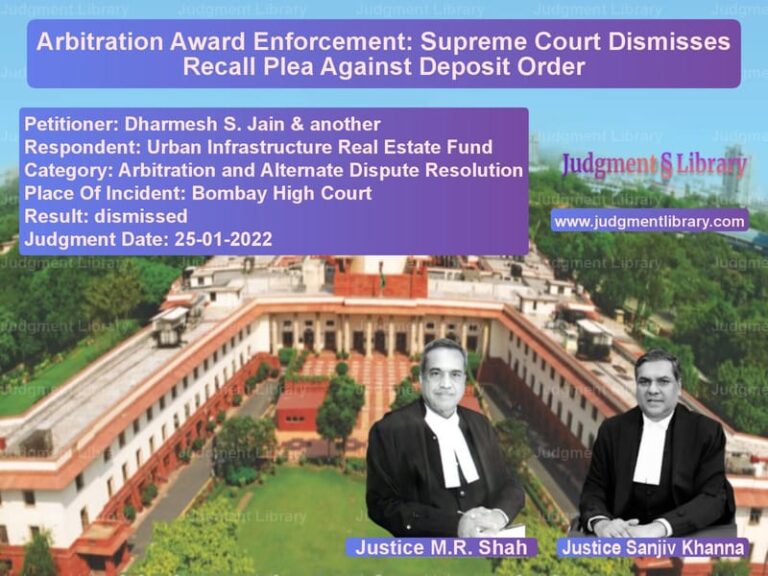Condonation of Delay in Specific Performance Appeal: Supreme Court Sets Aside High Court Order
The Supreme Court of India, in the case of Dr. Yashwantrao Bhaskarrao Deshmukh v. Raghunath Kisan Saindane, addressed an important issue concerning the condonation of delay in filing a second appeal in a case involving specific performance of a contract. The case, registered as Civil Appeal No. 6315 of 2021, arose from an appeal challenging the Bombay High Court’s decision to reject the appellant’s request for condonation of a 650-day delay in filing the appeal. The Supreme Court, in its judgment dated October 8, 2021, delivered by Indira Banerjee and J.K. Maheshwari, set aside the High Court’s order and directed the High Court to hear the appeal on its merits.
Background of the Case
The case originated from a suit filed by the respondent against the appellant for the specific performance of a contract related to an agreement to sell agricultural land dated February 18, 1998. The land in question, bearing Gat No. 21/1 and measuring 1.54 hectares, was situated in Maouje Hingone Sim, Tehsil Amalner. The trial court, in its judgment dated December 9, 2002, partially decreed the suit by directing the appellant to refund Rs. 61,000 along with 6% interest per annum but denied specific performance.
The respondent appealed against the trial court’s decision, and the matter was transferred to the Ad-hoc District Judge-I, Amalner, due to the enhancement of pecuniary jurisdiction. The appellate court issued notices to the appellant through paper publication, but he failed to appear. Consequently, on September 8, 2015, the appellate court reversed the trial court’s ruling and granted specific performance in favor of the respondent.
High Court’s Decision
Aggrieved by the appellate court’s ruling, the appellant filed a second appeal before the Bombay High Court, Aurangabad Bench, on September 18, 2017. However, there was a delay of 650 days in filing the appeal. The appellant sought condonation of delay on the ground that he became aware of the lower court’s ruling only on September 14, 2017.
The High Court, in its order dated August 7, 2018, rejected the application for condonation of delay, stating:
- The appellant’s claim of not being aware of the proceedings due to a change of address was not acceptable.
- The appellant failed to contact his counsel representing him before the lower appellate court.
- The respondent had been litigating for 17 years, and any further delay would deprive him of the rights accrued through the judgment.
Petitioner’s Arguments
The appellant, represented by his legal counsel, contended that:
- The suit was based on an agreement to sell, but the transaction was actually a money transaction.
- A sum of Rs. 90,000 had already been refunded, and only Rs. 51,000 was remaining.
- The trial court correctly decreed only a refund but denied specific performance.
- The appellant was unaware of the appellate court’s judgment due to a change of address.
- The High Court should have taken a lenient view and condoned the delay.
Respondent’s Arguments
The respondent, represented by his legal counsel, argued that:
- The appellant was duly served notices during the appellate proceedings.
- The appellant chose not to appear, leading to an ex-parte decree.
- The respondent had been litigating for 20 years, and further delays were unfair.
- The appeal before the High Court was barred by limitation, and no genuine reasons were provided for the delay.
Supreme Court’s Judgment
The Supreme Court set aside the High Court’s decision and directed it to hear the second appeal on merits. The key findings were:
- The High Court erred in rejecting the condonation of delay solely on technical grounds.
- The appellant had produced evidence of address change, which was not properly examined.
- Litigants often rely on their lawyers for updates on case status, and the appellant’s absence should not have led to dismissal.
- The principle of substantial justice should prevail over technical considerations of limitation.
Key Extract from the Supreme Court Judgment
“The High Court, while dismissing the application seeking condonation of delay, observed that sufficient cause for delay had not been established. However, considering the facts of the case, the appellant had produced documents proving his change of address. Without a proper inquiry, rejecting the condonation application was unjustified.”
Final Verdict
- The Supreme Court set aside the High Court’s decision and restored the second appeal.
- The High Court was directed to expeditiously decide the second appeal within six months.
- The decision ensures that litigants are not unfairly deprived of their rights due to procedural technicalities.
Impact of the Judgment
This ruling underscores the principle that justice should not be denied due to procedural delays. The decision:
- Reaffirms that courts must consider substantial justice over procedural technicalities.
- Ensures that litigants who genuinely missed proceedings due to address changes get a fair hearing.
- Provides a precedent for allowing condonation of delay in similar specific performance cases.
Petitioner Name: Dr. Yashwantrao Bhaskarrao Deshmukh.Respondent Name: Raghunath Kisan Saindane.Judgment By: Justice Indira Banerjee, Justice J.K. Maheshwari.Place Of Incident: Amalner, Maharashtra.Judgment Date: 08-10-2021.
Don’t miss out on the full details! Download the complete judgment in PDF format below and gain valuable insights instantly!
Download Judgment: dr.-yashwantrao-bhas-vs-raghunath-kisan-sain-supreme-court-of-india-judgment-dated-08-10-2021.pdf
Directly Download Judgment: Directly download this Judgment
See all petitions in Specific Performance
See all petitions in Property Disputes
See all petitions in Judgment by Indira Banerjee
See all petitions in Judgment by J.K. Maheshwari
See all petitions in allowed
See all petitions in Remanded
See all petitions in supreme court of India judgments October 2021
See all petitions in 2021 judgments
See all posts in Civil Cases Category
See all allowed petitions in Civil Cases Category
See all Dismissed petitions in Civil Cases Category
See all partially allowed petitions in Civil Cases Category







